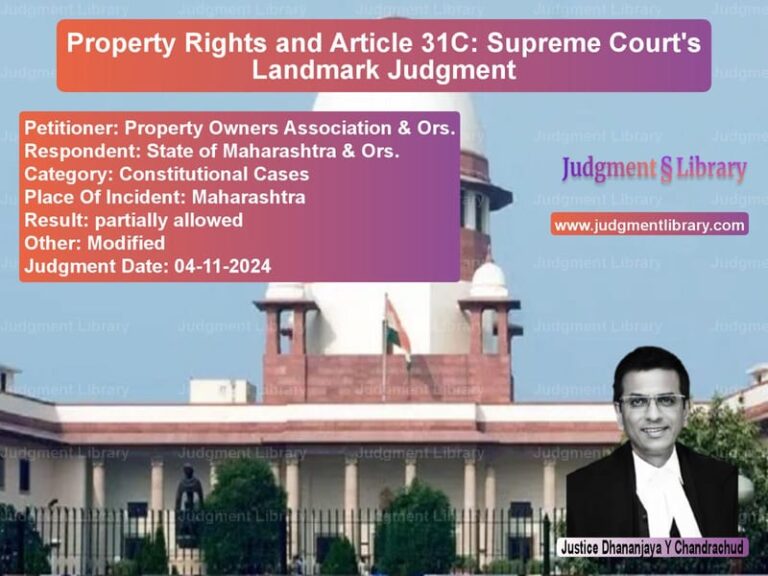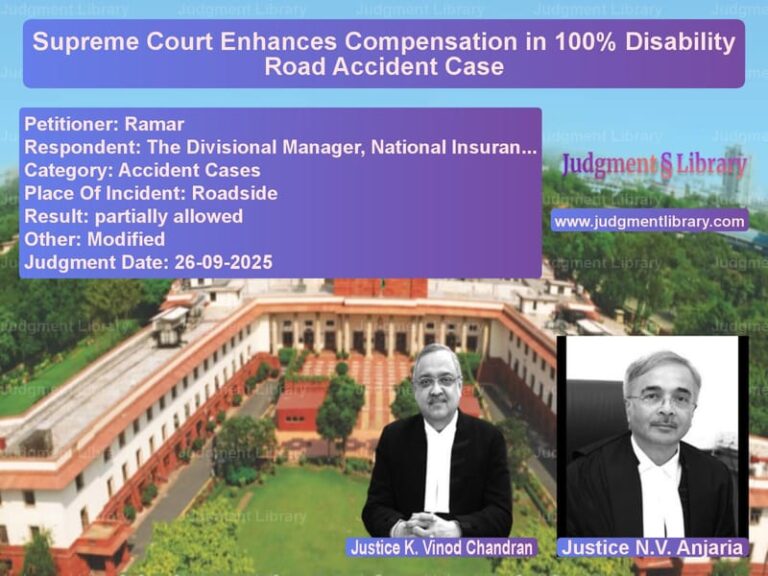Seniority Disputes in Government Appointments: Tamil Nadu Assistant Engineers Case Explained
The case of M. Kendra Devi vs. The Government of Tamil Nadu highlights a significant dispute regarding the seniority of Assistant Engineers in the Tamil Nadu Highways Engineering Service. The petitioners, who were direct recruits selected through a rigorous process by the Tamil Nadu Public Service Commission (TNPSC), contested the seniority granted to Assistant Engineers who were appointed on compassionate grounds. The dispute revolved around whether compassionate appointees, who were regularized later, should be placed higher in the seniority list than direct recruits who were appointed through open competition.
Background of the Case
The appellants, direct recruits, were appointed as Assistant Engineers after successfully clearing the TNPSC selection process. The first batch of direct recruits was selected in 1991-1992 but was appointed only in 1995, while the second batch was selected in 1993-1995 and appointed in 1998. However, a parallel set of appointments was made under a government policy that provided compassionate appointments to dependents of deceased government servants.
Read also: https://judgmentlibrary.com/supreme-court-upholds-transfer-policy-in-customs-and-excise-department/
Compassionate appointments were initially introduced through Government Order (G.O.) No. 1119, dated 20th May 1981, which permitted technically qualified dependents of deceased government employees to be temporarily appointed. This policy was later amended by G.O. No. 156, dated 16th July 1993, allowing their direct regularization. Consequently, compassionate appointees were granted regular employment status without having to go through the competitive TNPSC selection process.
The direct recruits challenged the legality of this process, arguing that the compassionate appointees, who had bypassed the selection procedure, were placed above them in seniority, despite the Supreme Court ruling in Umesh Kumar Nagpal v. State of Haryana (1994), which restricted compassionate appointments to Class III and IV posts only.
Petitioners’ Arguments
The petitioners, who were appointed as Assistant Engineers through TNPSC, contended the following:
- Compassionate appointments were an exception and not a rule in public employment. The normal procedure of selection through TNPSC should not be bypassed.
- Many of the compassionate appointees had either not participated in the open selection process or had failed to qualify but were placed en bloc senior to them.
- The compassionate appointees were initially recruited on a temporary basis and were later regularized through executive orders, violating Articles 14 and 16 of the Constitution.
- The Supreme Court, in Umesh Kumar Nagpal v. State of Haryana (1994), had explicitly ruled that compassionate appointments should be restricted to Class III and IV posts (now Group ‘C’ and ‘D’), yet the Tamil Nadu Government continued appointing compassionate candidates to Class II posts.
- Seniority should be granted based on merit and selection criteria, not on the basis of appointment under a special scheme.
Respondents’ Arguments
The government and compassionate appointees countered these arguments, stating:
- The compassionate appointees were appointed as per government orders and regularized in accordance with the applicable rules.
- Seniority was determined as per Rule 35(aa) of the Tamil Nadu State and Subordinate Services Rules, 1955.
- The compassionate appointees had been in service for over two decades, and reversing their appointments would create administrative chaos.
- These appointments were made in good faith to support families of deceased employees, ensuring financial stability.
- Since they had already been regularized and promoted over the years, disturbing their seniority now would be unfair.
Supreme Court’s Observations
The Supreme Court analyzed the case, considering both legal and humanitarian aspects. The Court noted:
“It is unfortunate that the Government of Tamil Nadu continued to make such compassionate appointments in Group ‘B’ posts from the year 1995 onwards, which indeed were de hors the judgment of this Court.”
The Court emphasized that while compassionate appointments serve a social function, they should not override the established recruitment process.
Final Judgment
Despite acknowledging the irregularity of these appointments, the Court ruled against disturbing the seniority list. The Court held:
- The appointments of compassionate candidates were indeed contrary to law, especially in light of the ruling in Umesh Kumar Nagpal.
- However, since the compassionate appointees had been in service for over two decades, removing them or altering their seniority at this stage would be impractical and unfair.
- The government was criticized for not implementing the Supreme Court’s directive in a timely manner, but it was not deemed appropriate to disturb the settled seniority of officers at this stage.
- The appeals were dismissed, and the compassionate appointees retained their seniority.
Key Takeaways
- This judgment highlights the importance of transparent recruitment procedures in government employment.
- The ruling emphasizes that Supreme Court decisions must be implemented promptly by state governments.
- It underscores that while compassionate appointments provide social relief, they cannot become a means to bypass merit-based selection processes.
- The case demonstrates the principle that long-standing appointments cannot be undone easily, even if they were initially irregular.
Implications of the Judgment
This judgment has far-reaching consequences for public employment, particularly in cases involving compassionate appointments. While the Court upheld the compassionate appointees’ seniority due to their prolonged service, it issued a strong message against circumventing established recruitment norms. The Tamil Nadu Government’s continued appointment of compassionate candidates in Group B posts, despite the 1994 ruling, was heavily criticized.
For future cases, this judgment establishes that:
- State governments must ensure that appointments align with constitutional principles.
- Compassionate appointments should be strictly limited to Group C and D posts, as per the Supreme Court’s previous directives.
- Seniority disputes in government employment should be resolved based on merit and established selection processes, not executive orders.
- Governments must act promptly to correct deviations from legal standards, rather than allowing them to persist for decades.
Overall, this case serves as a cautionary tale for government authorities, reminding them that legal compliance must take precedence over administrative convenience.
Petitioner Name: M. Kendra Devi.Respondent Name: The Government of Tamil Nadu and Others.Judgment By: Justice Ajay Rastogi, Justice Abhay S. Oka.Place Of Incident: Tamil Nadu.Judgment Date: 10-03-2022.
Don’t miss out on the full details! Download the complete judgment in PDF format below and gain valuable insights instantly!
Download Judgment: m.-kendra-devi-vs-the-government-of-ta-supreme-court-of-india-judgment-dated-10-03-2022.pdf
Directly Download Judgment: Directly download this Judgment
See all petitions in Employment Disputes
See all petitions in Promotion Cases
See all petitions in Recruitment Policies
See all petitions in Public Sector Employees
See all petitions in Termination Cases
See all petitions in Judgment by Ajay Rastogi
See all petitions in Judgment by Abhay S. Oka
See all petitions in dismissed
See all petitions in supreme court of India judgments March 2022
See all petitions in 2022 judgments
See all posts in Service Matters Category
See all allowed petitions in Service Matters Category
See all Dismissed petitions in Service Matters Category
See all partially allowed petitions in Service Matters Category







